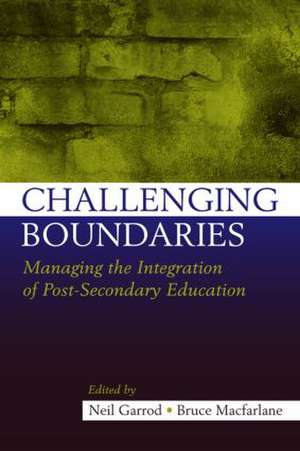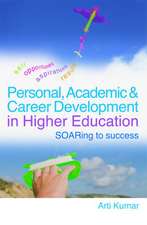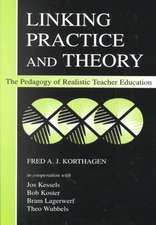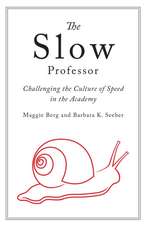Challenging Boundaries: Managing the integration of post-secondary education
Editat de Neil Garrod, Bruce Macfarlaneen Limba Engleză Paperback – 18 dec 2008
This volume draws on the very latest research findings and effectively looks to:
- Challenge conventional thinking about post-compulsory education
- Demonstrate how a number of institutions internationally are addressing the organizational, managerial, and cultural challenges of operating as dual sector universities
- Combine the latest research in the field from a range of international scholars with operational insights from university leaders
- Provide a key resource for education policy makers and researchers and students of educational policy and management at masters and doctoral level
| Toate formatele și edițiile | Preț | Express |
|---|---|---|
| Paperback (1) | 453.97 lei 6-8 săpt. | |
| Taylor & Francis – 18 dec 2008 | 453.97 lei 6-8 săpt. | |
| Hardback (1) | 1053.16 lei 6-8 săpt. | |
| Taylor & Francis – 18 dec 2008 | 1053.16 lei 6-8 săpt. |
Preț: 453.97 lei
Nou
Puncte Express: 681
Preț estimativ în valută:
86.88€ • 90.19$ • 72.44£
86.88€ • 90.19$ • 72.44£
Carte tipărită la comandă
Livrare economică 22 martie-05 aprilie
Preluare comenzi: 021 569.72.76
Specificații
ISBN-13: 9780415989329
ISBN-10: 0415989329
Pagini: 224
Ilustrații: 17 b/w images and 8 tables
Dimensiuni: 152 x 229 x 15 mm
Greutate: 0.41 kg
Ediția:New.
Editura: Taylor & Francis
Colecția Routledge
Locul publicării:Oxford, United Kingdom
ISBN-10: 0415989329
Pagini: 224
Ilustrații: 17 b/w images and 8 tables
Dimensiuni: 152 x 229 x 15 mm
Greutate: 0.41 kg
Ediția:New.
Editura: Taylor & Francis
Colecția Routledge
Locul publicării:Oxford, United Kingdom
Notă biografică
Neil Garrod is Executive Director, Enterprise and Civic Engagement at Glyndwr University, Wrexham (Wales), Honorary Professor in the Faculty of Economics at the University of Ljubljana (Slovenija) and Associate at the Centre for Higher Education Studies at the Institute of Education, University of London (UK).
Bruce Macfarlane is Professor of Higher Education at the University of Portsmouth (UK) where he is also Head of Academic Development. His previous books include Teaching with Integrity (Routledge, 2003) and The Academic Citizen (Routledge, 2006). He is a Vice Chair of the Society for Research into Higher Education.
Bruce Macfarlane is Professor of Higher Education at the University of Portsmouth (UK) where he is also Head of Academic Development. His previous books include Teaching with Integrity (Routledge, 2003) and The Academic Citizen (Routledge, 2006). He is a Vice Chair of the Society for Research into Higher Education.
Cuprins
Part 1 Challenges; Chapter 1 Further, Higher, Better?, NEIL GARROD, BRUCE MACFARLANE; Chapter 2 Further and Higher: A Philosophical Divide?, JOHN WHITE; Chapter 3 Post-secondary Education and Social Justice, LEESA WHEELAHAN; Part 2 Systems Responses; Chapter 4 Norway: Separate but Connected, ROMULO PINHEIRO, SVEIN KYVIK; Chapter 5 Australia: The Emergence of Dual Sector Universities, GAVIN MOODIE; Chapter 6 England: Merging to Progress, NEIL GARROD; Chapter 7 Canada: What's in a Title?, ROBERT FLEMING, GORDON R. LEE; Chapter 8 New Zealand: The Impact of the Market, JOHN WEBSTER; Chapter 9 South Africa: (re)Forming A Sector, MARTIN OOSTHUIZEN; Part 3 Operational Responses; Chapter 10 Governance, ROGER BARNSLEY, JOHN SPARKS; Chapter 11 Careers, NEIL GARROD, BRUCE MACFARLANE; Chapter 12 Community, BRONTE NEYLAND, LESLIE SKIP TRIPLETT; Chapter 13 Curriculum, NEIL GARROD, LIZ WARR;
Descriere
Challenging Boundaries is a key resource for managers, researchers, and policy makers in the fields of Higher Education and Further Education. Around the world, post-compulsory education is divided between Universities and Community-based Colleges. However, in response to a range of social and economic forces there has been a growth in the number of dual sector institutions (or "duals") that span this divide. Challenging Boundaries brings together leading international thinkers, policy analysts, academic managers, and researchers who question whether duals can provide relevant education to students and appropriate graduates for the economy, while also offering greater opportunities to disadvantaged students.









